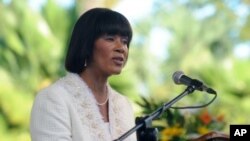Jamaica's new prime minister says she plans to cut ties with the British monarchy and make the country a republic. As Queen Elizabeth II prepares to celebrate 60 years on the throne, questions are being raised over the relevance of the monarchy to Britain's former colonies. But some analysts say the royal family remains popular across the Commonwealth.
Independence
Jamaica is celebrating 50 years of independence from Britain. At her inaugural address, newly elected Prime Minister Portia Simpson Miller said the anniversary provides an opportunity for Jamaica.
"As we celebrate our achievements as an independent nation we need to complete the circle of independence," said Miller. "In this regard we will initiate the process of our detachment from the monarchy, to become a republic with our own indigenous president as head of state."
Analysts say many Jamaicans see little point in retaining the Queen as head of state; it gives them no automatic right to British citizenship. There is lingering anger over Britain's role in the slave trade.
Reaction
Richard Fitzwilliams, an expert on the monarchy, says the Jamaican prime minister's announcement was met with surprise in Britain.
"The republican movement in the Caribbean, one thinks of Guyana and Trinidad and Tobago, there are precedents for it," he said. "Equally Jamaica has a history of being very pro-monarchy. I suspect that this is something to do with the political infighting there. I would be surprised if it was actually put to the people, that you would be definitely sure that you would get a vote for a republic."
Along with Britain, Queen Elizabeth is the head of state of 16 other nations, known as realms. Her role is purely ceremonial.
She is also head of the Commonwealth, an organization that rose from the ashes of Britain's Empire. Most of its 53 member countries are former colonies like Uganda, where the Queen visited in 2007.
Royal expert Richard Fitzwilliams says last year's wedding between Prince William and Catherine Middleton, gave the Monarchy's image a boost.
"The British Royal Family is the world's most high profile," he said. "I do think that in the Commonwealth, where the Queen is head of 16 realms, the Monarchy is undoubtedly at one of its peaks when it comes to popularity."
Relevance
But questions are being raised over the Commonwealth's relevance.
"It must become proactive. There is a need to revitalize the Commonwealth countries," said Ajit Prakash, an Indian human rights activist and former chief justice of the Delhi High Court. "The regime today has not really been able to stop human rights violations in several countries which are members of the Commonwealth."
To mark the Queen's Diamond Jubilee, members of the Royal Family will tour Commonwealth countries later this year. Prince Harry will visit Jamaica. By then, the country could be well on its way to abandoning his grandmother as its head of state.




